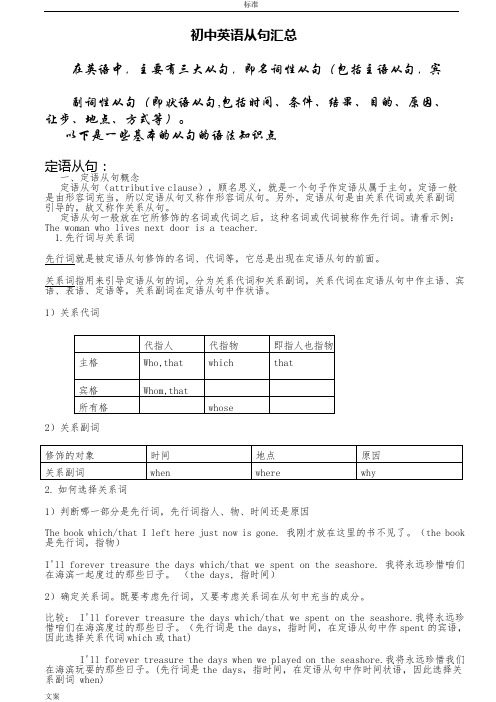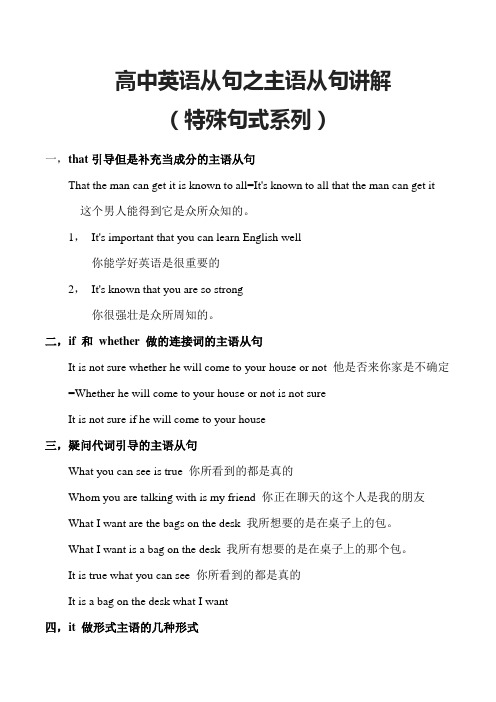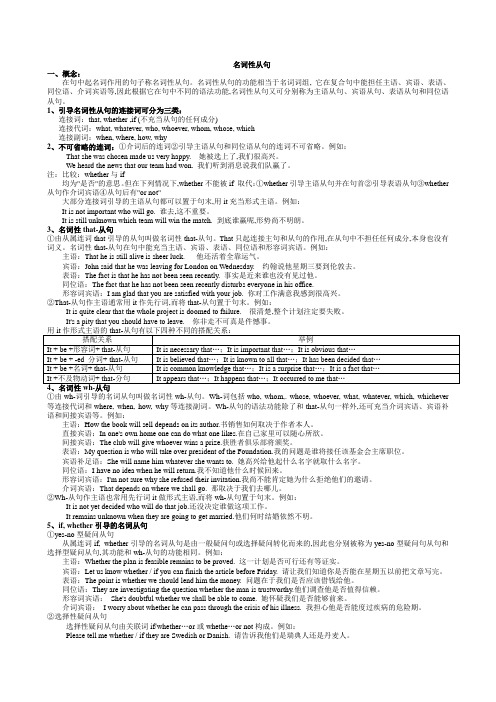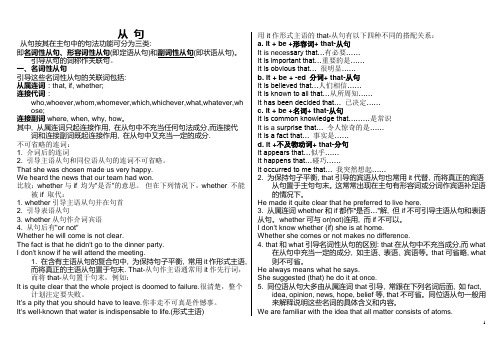三大从句的翻译与特殊句型
英语中三大类从句

从句概述
• 从句只能做主句的某一部分,依附于主句 而存在,不能独立。
• 从句也具有句子的特征,即有自己的主 谓结构;而且带有引导词。
• 根据从句在句中的作用,可分为名词性 从句、形容词性(定语)从句和副词性 (状语)从句三类。
一、名词性从句
名词性从句包括主语从句、宾语从句、表语从句和同位语从句。其关 联词有连词that, if, whether;连接代词what, who, which和连接副 词when, where, why, how等。
Ryan was worrying about whether he had hurt her feelings. ⑶ or not紧随其后时;I don’t care whether or not he has a holiday. ⑷ 后接不定式时。 She can’t decide whether to go.
连接词的用法 (三)
3.Who, whom, whose, what, which
连接代词Who, whom, whose, what, which等 在从句中既起连接作用,又担当主语、宾语、表 语等成分,并保留其特殊疑问词词义。如:
No one knows who he was waiting for. Tell me whose house it is. Let me know which train you will be arriving on.
④ It +v. (seems / happened, etc. )+that-clause It seems that Alice is not coming to the party at all. It happened that I was out that day.
初中英语从句语法总结

初中英语从句汇总在英语中,主要有三大从句,即名词性从句(包括主语从句,宾副词性从句(即状语从句,包括时间、条件、结果、目的、原因、让步、地点、方式等)。
以下是一些基本的从句的语法知识点定语从句:一、定语从句概念定语从句(attributive clause),顾名思义,就是一个句子作定语从属于主句。
定语一般是由形容词充当,所以定语从句又称作形容词从句。
另外,定语从句是由关系代词或关系副词引导的,故又称作关系从句。
定语从句一般放在它所修饰的名词或代词之后,这种名词或代词被称作先行词。
请看示例:The woman who lives next door is a teacher.1.先行词与关系词先行词就是被定语从句修饰的名词、代词等,它总是出现在定语从句的前面。
关系词指用来引导定语从句的词,分为关系代词和关系副词,关系代词在定语从句中作主语、宾语、表语、定语等,关系副词在定语从句中作状语。
1)关系代词2)关系副词1)判断哪一部分是先行词,先行词指人、物、时间还是原因The book which/that I left here just now is gone. 我刚才放在这里的书不见了。
(the book 是先行词,指物)I'll forever treasure the days which/that we spent on the seashore. 我将永远珍惜咱们在海滨一起度过的那些日子。
(the days, 指时间)2)确定关系词。
既要考虑先行词,又要考虑关系词在从句中充当的成分。
比较: I'll forever treasure the days which/that we spent on the seashore.我将永远珍惜咱们在海滨度过的那些日子。
(先行词是the days,指时间,在定语从句中作spent的宾语,因此选择关系代词which或that)I'll forever treasure the days when we played on the seashore.我将永远珍惜我们在海滨玩耍的那些日子。
高中英语从句之主语从句讲解(特殊句式系列)

高中英语从句之主语从句讲解(特殊句式系列)一,that引导但是补充当成分的主语从句That the man can get it is known to all=It's known to all that the man can get it 这个男人能得到它是众所众知的。
1,It's important that you can learn English well你能学好英语是很重要的2,It's known that you are so strong你很强壮是众所周知的。
二,if 和whether 做的连接词的主语从句It is not sure whether he will come to your house or not 他是否来你家是不确定=Whether he will come to your house or not is not sureIt is not sure if he will come to your house三,疑问代词引导的主语从句What you can see is true 你所看到的都是真的Whom you are talking with is my friend 你正在聊天的这个人是我的朋友What I want are the bags on the desk 我所想要的是在桌子上的包。
What I want is a bag on the desk 我所有想要的是在桌子上的那个包。
It is true what you can see 你所看到的都是真的It is a bag on the desk what I want四,it 做形式主语的几种形式1,常用形容词:Certain 明确的,clear 清晰的,important重要的,natural自然的,necessary 必要的,obvious明显的,unbelievable 难以置信的,strange 奇怪的,unlikely不可能的,right 正确It is unlikely that you can lift the big stone 你能举起这个大石头是不可能的。
英语的三大从句语法讲解

英语三大从句在英语中,主要有三大从句,即名词性从句〔包括主语从句,宾语从句,表语从句,同位语从句〕、形容词性从句〔即定语从句〕、副词性从句〔即状语从句,包括时间、条件、结果、目的、原因、让步、地点、方式等〕。
定语从句一、关系代词引导的定语从句关系代词代替前面的先行词,并且在定语从句中充当句子成分,可以作主语、宾语、定语等。
常见的关系代词有:who, that, which。
它们的主格、宾格和所有格如下表所示:〔一〕关系代词who, whom和 whose的用法who代替人,是主格,在定语从句中作主语。
An architect is a person who designs buildings. 建筑师是设计房屋的人。
whom代替人,是宾格,在定语从句作宾语,在非正式英语常可省略。
Do you know the gentleman whom we met in the school library yesterday? 昨天我们在学校图书馆里遇到的那位先生你认识吗?whose一般代替人,有时亦可代替物,是所有格,在定语从句作定语。
The girl student whose father is a senior engineer used to study abroad. 其父是一位高级工程师的那个女学生过去在国外留学。
Do you know the name of the hotel whose window we can see here? 我们这儿能看到窗户的那个宾馆叫什么名字,你知道吗?〔关系代词whose指代先行词hotel,正式用法应该用of which。
whose window=the window of which,意思是:the window of the hotel。
〕〔二〕关系代词which的用法which代替物,在定语从句作主语或宾语,作宾语时还可省略。
I do not like stories which have unhappy endings.我不喜欢有不幸结局的小说。
英语三大从句

英语三大从句LELE was finally revised on the morning of December 16, 2020复合句【语法要点】复合句是由一个主句加一个或几个从句所构成的句子。
从句只用作句子的一个成分,不能独立。
根据从句在句子中的作用,可分为名词性从句、定语从句和状语从句三类。
(一)名词性从句名词性从句包括主语从句、表语从句、宾语从句、同位语从句。
其关联词有连接词that、if、whether;疑问代词who、what、which和疑问副词when、where、how、why等。
1)if不能引导表语从句。
连接代词who、what、whose、which不能引导同位语从句。
2)有时as、as if/though、because也可以引导表语从句,能跟表语从句的谓语动词一般为系动词be、seem、look等。
例如:Things are not always as they seem to be.事情并不总是像表面上看来的那样。
It looks as if it were going to rain. It is because you eat too much.3)介词宾语不可以用which来引导,而要用what来引导。
例如:We can learn what we did not know. He will talk to us about what he saw in the .4)连词that引导的名词性从句除能用在except、but、in后之外很少作介词的宾语,。
其它一些介词的宾语从句如果由连词that引导,则需用it先行一步作形式宾语。
例如:He is a good student except that he is careless.You may depend on it that they will support you.5)若主句谓语动词是及物动词make、find、think、see、hear等,则把宾语从句置于宾语补足语之后,用it作形式宾语。
高中英语语法专题讲义:三大从句

名词性从句一、概念:在句中起名词作用的句子称名词性从句。
名词性从句的功能相当于名词词组, 它在复合句中能担任主语、宾语、表语、同位语、介词宾语等,因此根据它在句中不同的语法功能,名词性从句又可分别称为主语从句、宾语从句、表语从句和同位语从句。
1、引导名词性从句的连接词可分为三类:连接词:that, whether ,if (不充当从句的任何成分)连接代词:what, whatever, who, whoever, whom, whose, which连接副词:when, where, how, why2、不可省略的连词:①介词后的连词②引导主语从句和同位语从句的连词不可省略。
例如:That she was chosen made us very happy. 她被选上了,我们很高兴。
We heard the news that our team had won. 我们听到消息说我们队赢了。
注:比较:whether与if均为"是否"的意思。
但在下列情况下,whether不能被if 取代:①whether引导主语从句并在句首②引导表语从句③whether 从句作介词宾语④从句后有"or not"大部分连接词引导的主语从句都可以置于句末,用it充当形式主语。
例如:It is not important who will go. 谁去,这不重要。
It is still unknown which team will win the match. 到底谁赢呢,形势尚不明朗。
3、名词性that-从句①由从属连词that引导的从句叫做名词性that-从句。
That只起连接主句和从句的作用,在从句中不担任任何成分,本身也没有词义。
名词性that-从句在句中能充当主语、宾语、表语、同位语和形容词宾语。
例如:主语:That he is still alive is sheer luck.他还活着全靠运气。
三大从句讲解及练习(附有答案)

从句从句按其在主句中的句法功能可分为三类:即名词性从句、形容词性从句(即定语从句)和副词性从句(即状语从句)。
引导从句的词称作关联句。
一、名词性从句引导这些名词性从句的关联词包括:从属连词:that, if, whether;连接代词:who,whoever,whom,whomever,which,whichever,what,whatever,wh ose;连接副词where, when, why, how。
其中, 从属连词只起连接作用, 在从句中不充当任何句法成分,而连接代词和连接副词既起连接作用, 在从句中又充当一定的成分.不可省略的连词:1. 介词后的连词2. 引导主语从句和同位语从句的连词不可省略。
That she was chosen made us very happy.We heard the news that our team had won.比较:whether与if 均为"是否"的意思。
但在下列情况下,whether 不能被if 取代:1. whether引导主语从句并在句首2. 引导表语从句3. whether从句作介词宾语4. 从句后有"or not"Whether he will come is not clear.The fact is that he didn't go to the dinner party.I don't know if he will attend the meeting.1. 在含有主语从句的复合句中, 为保持句子平衡, 常用it作形式主语,而将真正的主语从句置于句末. That-从句作主语通常用it作先行词,而将that-从句置于句末,例如:It is quite clear that the whole project is doomed to failure.很清楚,整个计划注定要失败。
中考英语二轮复习三大从句

handsome是: 定语 ,作用是 修饰后面的名词boy。
her是: 定语 ,作用是 修饰后面的名词friend 。
2)The handsome boy who is singing is her friend.
请翻译此句:这个正在唱歌的帅气男孩是她的朋友 。
此句中,who is singing作为 定语 成分,作用是 修饰前面的名词boy 。
1、理解“定语”: 定语是用来修饰、限定、说明名词或代词的品质与特征的。
分析以下例句的句子成分:
1)The handsome boy is her friend.
请翻译此句: 这个帅气的男孩是她的朋友 。
The handsome boy是: 主语 。
is是: 谓语 。
her friend是: 表语 。
【课堂练习】
B 1.We don’t know________ , but it tells us the importance of friendship.
A.what the story is about
B.whether the story is true
C.when did the story take place
① 翻译:尽管他没有说什么,我明白他的意思。
Although he said nothing, I understand his meaning.
B ②( ) John said he wasn’t frightened, ______ I can feel his heart quickly.
A. Although; but
①后面有…or not;②在介词的后面; e.g: I am interested in whether he will come tomorrow.
- 1、下载文档前请自行甄别文档内容的完整性,平台不提供额外的编辑、内容补充、找答案等附加服务。
- 2、"仅部分预览"的文档,不可在线预览部分如存在完整性等问题,可反馈申请退款(可完整预览的文档不适用该条件!)。
- 3、如文档侵犯您的权益,请联系客服反馈,我们会尽快为您处理(人工客服工作时间:9:00-18:30)。
By Yolanda
三大从句的翻译方法
• 名词性从句, • 形容词性从句 • 状语从句
名词性从句
• what, how, whether, that, where, when, 引导的名词性从 句,用来做主语,宾语,表语,介 词宾语或者同位语
状语从句
3.Though引导 Though引导的从句可放在主句前,也 可放在主句后面。 翻译不同:在前翻译为“虽然…“、”尽 管...”; 在后翻译为“可是”,“不过”,“然而”
状语从句
Thought the task was difficult, they managed to accomplish it in time. 虽然任务艰巨,他们还是设法及时完成了。 He was old and poor, though he was happy 他又老又穷,但过得却快活。
状语从句
• 特殊状语从句 1.That引导 2.Before引导 3.Though引导 4.Because引导 5.Until 引导
状语从句
1.That引导 1)“the+形容词或副词比较级 +that从句” 表示原因。 the act was the bolder that he stood utterly alone.
常翻译为独立的分句,或独立从句
名词性从句与形容词性定语从句
从成分来看: • 名词性从句,做主语,宾语,表语,介词宾 语或者同位语; • 形容词性定语从句,在句子中作定语; 从结构来看: • 名词性从句,前面没有要修饰的名词; • 形容词性定语从句,前面有要修饰的名词。
That名词性从句与that引导的形容词性 定语从句 eg: that you have done such a stupid thing was incredible. eg: I saw the cat 【that caught the rat】 【that ate the grain】 【 that in the house】 【that jack built】.
• 你们英国女人每天狼吞虎咽的吃三到 五餐肉食,你拿她和她们比,当然觉 得她是个苗条仙女了。 放在主句前面,为了强调
形容词性从句
3.翻译为状语从句
• The thief who was about to escape was caught by the police. • 小偷要跑时,被警察抓住了。
状语从句
1.That引导 4)“the rather that从句)” 表示 原因,翻译为“因为……”。 I „m glad of it, the rather that you will benefit by it.
我感到高兴,因为它对你有益。
状语从句
1. That引导 5)“for all that从句)” 引导让步状语 从句, 翻译为“尽管…””虽然…“。 For all that he seems so badtempered, I still think he has a very kind nature. 尽管她好像脾气很坏我仍然认为他心 地善良。
名词性从句
• What引导
eg: 【what was once regarded as impossible】 has now become a reality.
过去认为不可能的事现在已经成为现实。
eg: 【 what someone chooses to observe 】 and the way one observes it must, after all, in part be a reflection of experience and of ideas as to 【 what is significant 】.
状语从句
1. That引导 6)“but that从句” 引导让步状语从句, 翻译为“要不是…的话“”如果不是… 的话”。 but that he helps, I should fail. 要不是他帮忙的话,我就失败了。
状语从句
1. That引导 7)“so much so that从句” 相当于 “to that extent so that”, 翻译为 “甚至“”以至于…”,“因此”等等。 he is very ignorant so much so that he cannot read his own name. 他非常无知,甚至连自己的名字都不 认识。
形容词性从句
限定性定语从句与非限定性定语从句
• The thief who was about to escape was caught by the police. • The thief, who was about to escape, was caught by the police. • They are short of sticks to make frames for the climbing vines, without which the yield of grape would be halved.
什么时候开始工作还没决定呢。
• where 引导 Eg: that‟s 【where we differ】. 这就是我们的分歧所在。
总结: when引导, where 引导名词性从句, 直接翻译“…时候”“…地方”。
名词性从句
• that引导 eg: 【 that you have done such a stupid thing】 was incredible.
他干多少并不重要,问题是他到底有没有干。
I wonder 【 whether he will come in such a bad day】. 我不知道在这样的天气里他是不是能来 总结: whether引导名词性从句,翻译为
双重否定“是不是,能不能….”
名词性从句
• when引导 eg: 【 when we will begin to work】 has not been decided yet.
状语从句
1. That引导 3)“not that…but (that)” 表示原因, 翻译为“不是因为…而是因为…”。 it is not that I am unwilling to go with you, but that I‟m busy now. 不是因为我不愿意跟你一起去,而是因为我 现在很忙。
形容词性从句
1.前置定语 • This is the reason 【why I am not in favor of revising the plan】. • 这就是我不赞成修改计划的原因
翻译为“…的”+前面的名词
形容词性从句
2.翻译为独立的并列分句
• They are short of sticks to make frames for the climbing vines, without which the yield of grape would be halved.
你竟然做这么傻的事情,(这)真叫人难以 置信。 总结:that 引导的名词性从句常常表示强烈 愿望或惊讶,愤怒等。 如果that从句过长,常常在后半句加上 “这”。
形容词性从句
• Which,why, that, who, where, when,as引导, 常作定 语,但是还表示原因,转折等含意, 翻译要变通处理。
我不知道该如何做。
That was 【 how they were
defeated 】.
他们就是这样给打败的 总结: how引导名词性从句,翻译为“ 如
何…,这样…,那样….”
名词性从句
• whether引导 eg: it isn‟t much 【 whether he works】; the question is 【 whether he works at all 】.
名词性从句
eg: 某人选择观察的事物和他观察的方式 在某种程度上一定反映这个人的经历和他 关于重大的事件的看法
总结:what引导名词性从句,翻译 成名词,“…的事(情)”,在句子 中做主语,宾语,表语,介词宾语或 者同位语
名词性从句
• how引导
eg: I don‟t know 【 how to do 】.
状语从句
2.Before引导 Before引导状语从句表示“在…之前” 但由于汉英表达方式不同,翻译成 汉语时,表达有多种。
Be a pupil before you become a teacher. 做先生之前,先做学生. 先做学生,再做先生.
状语从句
2.Before引导
Before I could say a single word, he ran away. 在我能说一句话之前,他跑掉了。 我连一句话也没来得及说他就跑了.
状语从句
4. Because引导 Because引导的从句, 主句是肯 定的,主句是否定的,翻译不同, 要根据上下文的内涵逻辑而定。
状语从句
4. Because引导
I didn’t go because I was afraid。
我不是因为害怕才去的。 He cannot go to school because he is sick. 他因为生病不能上学。
He must be ill, for he is absent 他肯定是病了,因为他没来。 他没来,肯定是病了。
状语从句
• When we were about to get away, a police car came to the front door.
1)当我们正要离开的时候,一辆警车 来到了前门。 2)我们正要离开,一辆警车来到了前门。 翻译壮语从句时,省略连词可以使译文 更简洁通俗。
形容词性从句4.翻译为谓语 Nhomakorabea构或者宾语结构
